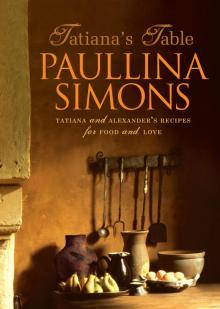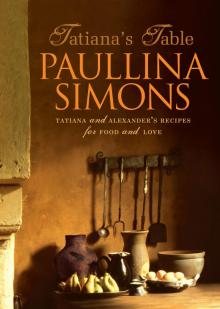- Home
- Paullina Simons
Tatiana's Table Page 13
Tatiana's Table Read online
Page 13
“Tania, you know what you haven’t made in a while?”
They were sitting by the pool as the sun was setting. The children were jumping off the diving board—Tatiana would have liked to say one at a time, but it would not have been true.
“What haven’t I made in a while? Corn?”
“No, you’ve made plenty of that. Francesca’s guacamole.”
Tatiana pondered. It was true, but why? “Well,” she said at last, “we haven’t had anyone over on the weekends recently, and the kids hate guacamole.”
“This is true,” said Alexander. “But you know who doesn’t hate guacamole?”
“Um—you?”
“That’s right.”
“And me. So, OK, I make guacamole tonight.”
“Good. And I’ll get Harry to eat it. And if he eats it, Pasha will eat it. And if they eat it, Janie will eat it because she wants to be a boy.”
“Um—do you need to be a boy to eat guacamole?”
“Tania.”
“OK, OK, I’m going.”
Anthony was not home anymore. He was in Vietnam.
Avocado should not be too mushy, nor too hard. It should feel springy when touched, like a peeled orange. If it feels like a walnut, don’t buy, if it feels like a mashed mango, don’t buy.
2 ripe, slightly softened avocados
2–3 tablespoons very finely chopped red onion
1 large garlic clove, grated
juice of ½ lime
3 tablespoons very finely chopped cilantro (coriander), or to taste
salt, to taste
1 small red tomato, finely chopped
Cut the avocados in half, scoop out the pit, then scoop the meat into a mortar. Add minced onion, garlic, lime juice, cilantro, salt and tomato. Mash coarsely with a pestle, making sure to leave some chunks.
Sure enough, when the guacamole was brought out, eight-year-old Harry dipped in his tortilla chip and ate it, alongside his dad. Pasha watched for a little while, uncertainly, but his mother, his father, and now his youngest brother were eating it. Clearly he had no choice. He dipped his chip in.
“I want some!” whined Janie. And she had some, too.
“How did you get Harry to eat it?” Tatiana later asked.
“Simple,” said Alexander. “I told him it’s what his dad lived on when he was in the forests of war-torn Europe.”
“Shura! It’s a sin to lie to your children.”
“No, it isn’t.”
“Someday he’ll find out you didn’t know what an avocado was in the forests of Europe.”
“My work by then will be done.” Pause. “You know what else you haven’t made in a while?”
“What, my love? Blinchiki? Pirozhki? Cabbage Pie? I haven’t made that in fifteen years.”
Alexander would not be baited. “No. Salsa.”
“Salsa?”
“Yes. Salsa, with cream cheese on the side.”
Salsa
3 ripe tomatoes, finely diced
½ jalapeño chili, seeded, and very finely chopped
4 tablespoons fresh cilantro (coriander), chopped
2 garlic cloves, very finely chopped
¼ red, Vidalia or other sweet onion, very finely chopped
juice of 1 lime
salt, to taste
Combine all ingredients and mix well. Serve with chips and cream cheese on the side.
Meatball Soup
Francesca taught Tatiana meatball soup. When Tania made the meat filling for blinchiki, she made the soup at the same time.
It went nicely with blinchiki or pirozhki. Even Francesca thought so, and she had previously had meatball soup only when accompanied by fajitas. So Francesca and Tatiana decided that meatball soup can be Russian and Mexican. It was inter-cuisinary.
When Tatiana cooked just for Alexander, Anthony, and herself it was easy to make plenty. But after Pasha and Harry were born, and after Janie, she had to ration the meatballs to the children, because there was no amount she could make that could fit in the pot that would be enough for them. No matter how many she made, they consumed them all.
Broth:
8 cups (1.8 liters) cold water
1 large onion, peeled and left whole
3 garlic cloves, sliced crossways
16oz (450g) canned peeled whole tomatoes
salt and pepper, to taste
¼ cup fresh cilantro (coriander)
4 medium potatoes, peeled and cubed
4 carrots, peeled and thinly sliced
Meatballs
2lb (900g) ground beef sirloin
½ cup (95g) raw white rice
1 large onion, grated
2 garlic cloves, grated
½ cup (25g) breadcrumbs
salt and pepper, to taste
Fill a large pot with 8 cups (1.8 liters) water, and while bringing to boil, add onion, garlic, canned tomatoes, fresh cilantro, and salt and pepper, to taste. (Make sure the tomatoes are peeled, otherwise the tomato skins separate; since they don’t soften, they’re impossible to eat.)
Meanwhile in a large bowl combine ground sirloin and uncooked rice. Add grated onion, grated garlic, salt, pepper, and breadcrumbs, mix well.
Make the meatballs. Drop them into the boiling broth. Bring back to boil, cover, lower heat, and simmer for 45 minutes. Add potatoes and carrots, bring back to boil, lower heat, simmer for 30 minutes or until the vegetables are soft. Adjust seasoning as necessary. You can serve this soup with blinchiki, but it’s like a meal in itself.
Fajitas
Alexander called Tatiana a cooking chameleon. Just as Leningrad cooking had Russian influence, and lower New York cooking had Isabella’s Italian influence, and Esther’s cooking had the American, New England Pilgrim influence, so Arizona’s cooking was stamped with Francesca’s Mexican roots.
The sainted Francesca taught Tatiana fajitas. “For señor Alexander,” she said. “He will like.”
“Oh, yes, he will, Francesca,” said Tatiana.
She taught Tatiana this, and meatball soup. Both became a staple in the Barrington household.
1½–2lb (700–900g) flank, skirt or blade steak
juice of 2 limes
3 garlic cloves, very finely chopped
1 medium onion, thinly sliced
5 tablespoons olive oil, for frying
½ teaspoon ground cumin
4 tablespoons chopped cilantro (coriander)
1 green or red pepper (capsicum), seeded, and thinly sliced
Optional:
half a small jalapeño chili, coarsely chopped. Jalapeño is very spicy, be careful not to touch your eyes as you chop it. Tatiana once tasted the marinade and then, in a fit of affection, kissed Alexander’s eyes. He was not happy.
Slice the steak against the grain into long strips ½ in (1cm) wide. Place in a large bowl, add other ingredients, mix and marinate, the longer the better, overnight is ideal.
Heat a heavy-bottom skillet on medium-high, add 3 tablespoons olive oil, add steak, and fry for 5–7 minutes, turning over after 4 minutes, until well-browned on all sides, but still pink inside. Cook on higher heat if you want it less cooked inside, but still nicely browned on the outside. Remove meat from heat, add remaining 2 tablespoons olive oil, add the onion and green pepper from the marinade, drain of liquid, and cook on high heat for 2–3 minutes until sizzling brown.
Serve fajitas with refried beans, guacamole, salsa, grated cheese (Monterey Jack or mild cheddar), sour cream, and warm tortillas.
Oh, and lime and cilantro rice.
Lime and Cilantro Rice
5 cups (1.25 liters) chicken stock
½ cup (110ml) white wine
juice of 2 limes
2 tablespoons olive oil
1 small onion, very finely chopped
½ teaspoon salt
pepper, to taste
1 cup (200g) long-grain or basmati rice
2 garlic cloves, very finely chopped
2 tablespoons butter
2 tablespoons fresh cilantro (coriander), chopped
Optional:
1 cup (225g) grated Monterey Jack or other hard, mild cheese
In a medium saucepan, bring chicken stock, white wine, and juice of limes to a boil, reduce heat. Meanwhile, in a large, heavy-bottom skillet heat olive oil on medium-high, add onion, cook, stirring constantly for a few minutes. Add salt, pepper, and stir. Add rice, coat well, add garlic, stir and cook for another half a minute. Add the lime-wine stock, stir well, cover, lower heat to medium and cook for 15 minutes until liquid is absorbed and rice is tender. Remove from heat, add butter and cilantro, stir, serve. Sprinkle cheese on top without stirring through.
Cajun Chicken with Lime
Lime is like cilantro, Francesca taught Tatiana. You put it in beer, in tequila, over rice, in marinade, always on chicken. “And when you have a headache, rub a little lime juice on your forehead.”
“On your forehead, really?”
“Really.”
Alexander had walked into the kitchen. “Francesca, do you really need lime on your forehead after all that lime-infused tequila? I think intravenous lime will have probably done the trick, no?”
“What he say?” Francesca asked Tatiana. “I tell by his face he teasing me, but what he say?”
4 garlic cloves, very finely chopped or grated
1 medium onion, sliced
juice of 1 lime
1½ cups (340ml) buttermilk. If you can’t find buttermilk use yogurt
2 teaspoons salt
2 teaspoons Cajun seasoning
2lb (900g) thick chicken breast fillets
In a large mixing bowl combine all ingredients except the chicken. Add the chicken, mix thoroughly with the marinade. Cover with a small plate, put large weight on top: a 3lb (1.35kg) weight, a rock, a jar of pickles, etc. Marinate in the fridge for 4–8 hours.
The buttermilk makes the chicken unbelievably tender, and difficult to overcook. You can also marinate chicken breast on the bone, if you prefer.
To prepare for cooking, take chicken out of the marinade and pat dry with paper towels. To cook you have a few options:
a) If it’s summer, you can cube the chicken, thread onto skewers and grill on the barbecue for 2 minutes a side on medium, with the cover closed.
b) You can add vegetables or onions in between the chunks of chicken and make like a shish-ke-bob.
c) Or you can grill the chicken breasts whole on the barbecue.
Beergaritas
“Tania, it’s Saturday night.”
“Yes, so?”
“Anthony is asleep.” It was just the three of them back then.
“Yes, so?”
“So, so. You know what time it is, don’t you?”
“Tea time?”
“No.”
“Um, bedtime?”
“Not quite.” He grinned. “Beergarita time.”
“Oh, that time.”
112–16oz can frozen sweetened lime juice concentrate, such as Limeade
2 fresh limes, quartered
1¼ cups (275ml) Patron Reposado tequila
5oz (150ml) Triple Sec or Cointreau (you can try Grand Marnier but Tania finds it not sweet enough)
2 bottles Corona or Rolling Rock beer, or any lager beer of your choice
Ice
In a large pitcher, combine all ingredients; except for the beer, stir well to mix. Add beer, serve. Tatiana doesn’t recommend putting through a blender, the fizziness of the beer works against the taste, and she definitely doesn’t recommend driving afterward. It’s stunningly and deceptively potent. It tastes as if you’re drinking a Corona with lime. And suddenly—you’re acting silly and singing in Mexican. And when you say you don’t know any Mexican, Tatiana says, that’s exactly my point. More on that below:
Best Ever Rum Cake:
1 tablespoon sugar
1 cup (175g) dried fruit
1 teaspoon soda
2 large eggs
lemon juice
1 or 2 quarts (900ml or 1.8 liters) good, dark rum
1 cup (200g) brown sugar
1 cup (225g) butter
½ teaspoon baking powder
½ cup (50g) chopped walnuts (black if you can find ’em)
Select a large mixing bowl, measuring cup, etc. Before starting, sample the rum to check quality. Good, isn’t it? Now proceed:
Check rum again, it must be just right. To be sure rum is the proper quality, pour one level cup of rum into a glass and drink it as fast as you can … good rum goes down smooth and easy. Bad rum won’t. Repeat to make sure it is good quality.
With electric mixer, beat 1 cup of butter in a large fluffy bowl. Add 1 seaspoon of thugar and beat again. Meanwhile, make sure rum is still alright. Try another cup. Open second quart if necessary. Add leggs, 2 cups dried druit and beat till high. If druit gets stuck in beaters, pry loose with drewscriber. Sample rum again, checking for tonscisticity. Next sift 3 cups pepper or salt (really doesn’t matter). Sample rum. Sift ½ pint lemon juice. Fold in chopped butter and strained nuts. Add 1 tablespoon of brown thugar—or whatever color you can find. Wix mell. Grease oven. Turn cake pan to 350 gradees. Pour mess into boven and ake. Check rum again and go to qed.
Banana Bread
When Tatiana first came to America, the bananas never ripened. They never ripened because she would eat them before they did. She bought them barely yellow and ate them barely yellow. She had never had bananas in the Soviet Union and now feasted on them the way she feasted on bacon. Then slowly, the bananas started hanging on the hook longer and longer, getting more yellow, getting black-pitted. She didn’t like to eat them when they were overripe, so she started figuring out what else to do with them. She put them over her cold cereal, ate them with vanilla yogurt, mashed them and put them in her pancakes, and she dipped them in chocolate (20 oz(570g) melted chocolate chips, 1 stick (110g) melted butter) and called them chocolate covered bananas. She served them at barbecues with chocolate covered strawberries and they were the highlight of the party. But the bananas were still going too ripe. She could have just stopped buying them, but that was like saying she should stop making bread every other day. The bananas represented a different life. Bananas, plantains, sweet potatoes, corn, turkey were all symbols of the new world. So she bought them every time she bought milk, like a staple, and they hung on the hook. That’s when Tatiana started making banana bread. She tinkered with this recipe, putting in too many eggs and too much flour, not enough sugar, not enough bananas. There was a period of months in the ’50s when Alexander and Anthony ate banana bread every week. One took it to work, one took it to school. “Is it good?” she would ask them, and they would reply, “It is good.”
She would pause. “Why don’t you like it?”
“I like it,” Alexander would say.
“No, you don’t. I can tell by your face. Why are you reserved? Why don’t you like it?”
“I’m not reserved. I like it.”
The next day there would be new banana bread. “Try this. Maybe this is better. I put more sugar in.”
Alexander would taste it. “It is good.”
“Oh, no. Why don’t you like it?”
And so it went. Still her boys took it with them, but finally, after some months, Tatiana figured it out.
“OK,” she said. “Taste this.”
Alexander tasted. “Oh my God.”
“Ah. Now you like it.”
And the irony was, once she figured it out, she stopped making it quite as often, but the irony was, once she figured it out, Alexander and Anthony couldn’t stop asking for it.
This is that recipe.
Banana Bread:
1 stick (110g) butter, at room temperature
1 cup (200g) sugar, at room temperature (Ha!)
2 eggs, at room temperature
4 teaspoons fresh lemon juice
1 teaspoon grated orange zest
⅓ cup (75ml) water
1 teaspoon vanilla extract
1¾ cups (220g) all-purpose (plain) flour, sifted
1 teaspoon baking soda
½ teaspoon salt
Preheat oven to 350°F (180°C). Grease the bottom of a loaf or pound-cake pan. Cream butter and sugar in an electric mixer. Add eggs, lemon juice, orange rind, water, vanilla, and then the bananas. Mix thoroughly so the bananas become smooth, not chunky. In a separate bowl combine flour, baking soda and salt, and fold into the banana mixture on low until just mixed. Pour into the cake pan and bake for 45 minutes or until pick inserted just off center comes up clean. Leave for 5–10 minutes in pan, then turn out onto plate.
Optional:
add ½ cup (50g) chopped walnuts, or ½ cup (75g) chocolate chips. Or both. Everyone loves the chocolate chips.
Fudgy Chewy Brownies
Pasha tried to be stoic when it came to fudge brownies, but his undeniable weakness for them propelled him into his mother’s kitchen where he would stand timidly near the mixer, pretending to be interested in just the ingredients that went into the batter. “How long do we have to beat the egg yolks for? Fifteen minutes? Wow. Why so long?” He watched the sugar, the eggs. He offered to help his mother melt the chocolate. He carried the melted chocolate to the refrigerator to cool it. He kept time, monitored the room temperatures of things. It was all with one goal in mind. To get the wooden spoon and the mixing bowl after the brownies went in the oven. Tatiana started leaving a little more in the bowl, to please her son. Then a little more. Eventually, it became clear: she had to double the recipe in order to please him completely and still have mixture left over for baking. When she doubled the recipe the rest of the children got to lick the bowl also. But no one enjoyed it as much as moderate, composed, not-easily-rattled Pasha. Harry and Janie and Alexander had other weaknesses; brownies were Pasha’s.

 The Summer Garden
The Summer Garden Six Days in Leningrad
Six Days in Leningrad Bellagrand
Bellagrand Tatiana and Alexander
Tatiana and Alexander Road to Paradise
Road to Paradise The Bronze Horseman
The Bronze Horseman Eleven Hours
Eleven Hours Tatiana's Table: Tatiana and Alexander's Life of Food and Love
Tatiana's Table: Tatiana and Alexander's Life of Food and Love The Girl in Times Square
The Girl in Times Square The Tiger Catcher
The Tiger Catcher Lone Star
Lone Star Children of Liberty
Children of Liberty A Beggar's Kingdom
A Beggar's Kingdom Inexpressible Island
Inexpressible Island Tatiana and Alexander: A Novel
Tatiana and Alexander: A Novel Tatiana's Table
Tatiana's Table A Song in the Daylight (2009)
A Song in the Daylight (2009)